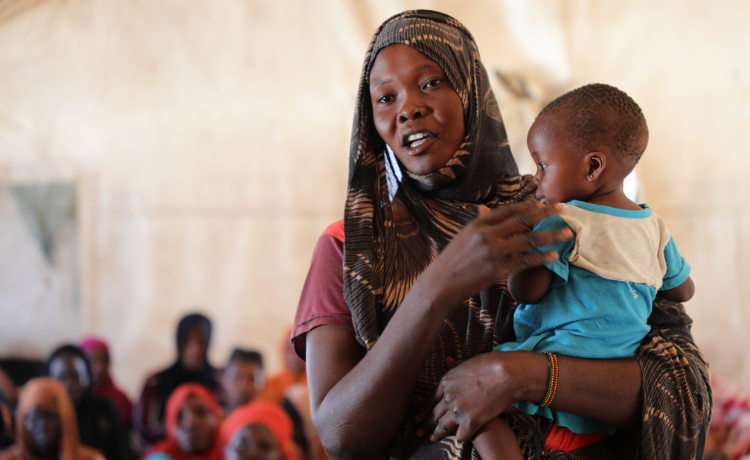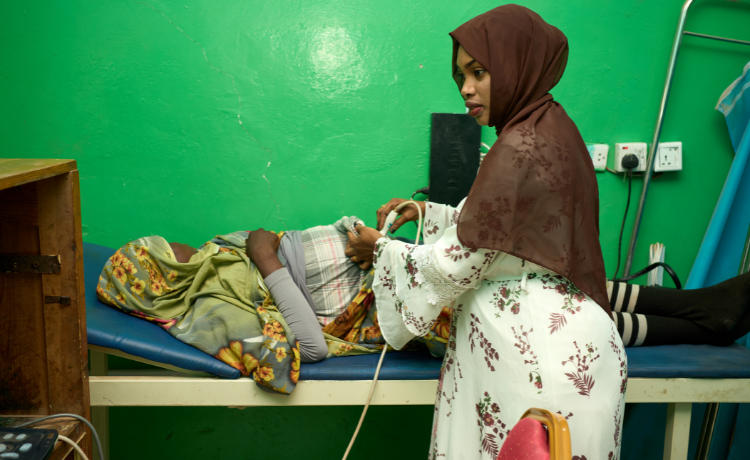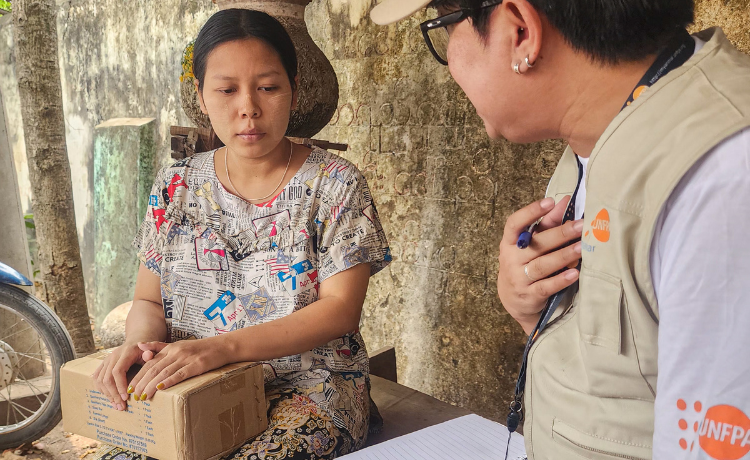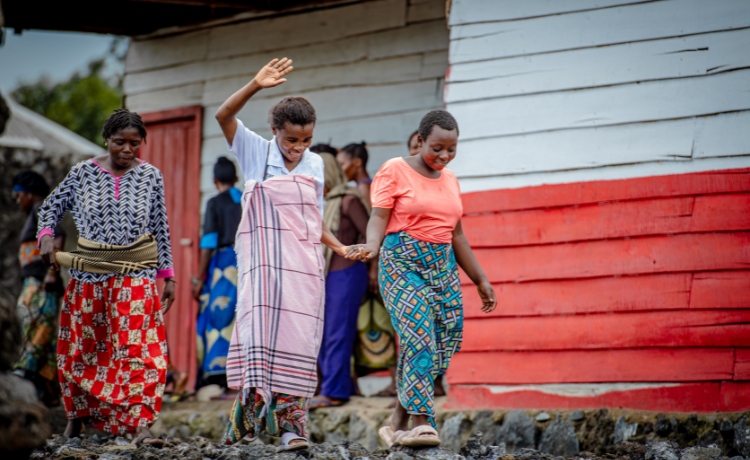News
Don’t let the lights go out: UNFPA urges support for women and girls in the world’s most neglected crises
- 28 May 2025
News
UNITED NATIONS, New York – In 2025, as crises multiply and conflicts become increasingly protracted, humanitarian aid budgets are being slashed across the board. Yet in many emergency settings, it is ordinary people – and especially women and girls – who are feeling the sharpest impact of these cuts.
For those caught up in crises that have already been neglected for years, the fallout is all the more brutal. But what does chronic underfunding look like?
It means not having enough midwives to support women in labour, or sufficient medicines and equipment to handle childbirth complications. It’s safe spaces that have to close their doors to survivors of violence, and a lack of family planning advice and supplies to help women and girls avoid unintended pregnancies and sexually transmitted infections.
UNFPA’s new campaign shines a light on how record funding gaps are already impacting its life-saving work, and what’s urgently needed to contain the catastrophic repercussions for millions of women and girls.
1. Safe spaces and health facilities for refugees and host communities under threat of closure

“Here at this centre, we can forget all the trauma we went through. If it closes, where do we go?”
A survivor of gender-based violence at a UNFPA safe space in the border town of Renk, in South Sudan’s Upper Nile State, was distraught to hear it might be closing. The spaces provide psychological support and protection for women and girls both from the local community and for the many refugees fleeing conflict in neighbouring Sudan.
An adjacent health facility ensures reproductive health services, including clinical management of rape, maternity care, psychological support, and emergency obstetric and newborn care. But resources are severely stretched as more people arrive and supplies run low; with recent funding cuts, three facilities in South Sudan have scaled back operations and two are shutting down entirely.
Wod Changjwok, a case worker at the safe space, explained, “We only have one month left [of funding] before the project will have to close. If it closes, we will go back to zero.”
In crises, women and girls are twice as likely to be subjected to gender-based violence than in non-humanitarian contexts. Yet a lack of funding means survivors are often deprived of medical care, treatment of sexually transmitted infections, counselling and access to safe spaces.
The loss of U.S. funds for South Sudan means more than 330,000 displaced women and girls are losing access to these services. “We’re running out of options,” said Hussein Hassan, UNFPA’s emergency coordinator in South Sudan. “We are very grateful for the donors who have responded, but we're appealing to others to ensure we can continue life-saving interventions. We must leave the lights on for these women and girls.”
UNFPA is appealing for $17.5 million to address critical humanitarian needs in South Sudan in 2025. Just half of the appeal was covered in 2024.
2. Already marginalized groups risk being left behind entirely

Research shows that people living with a disability face higher rates of sexual assault, forced sterilization and denial of their rights to make choices about their sexual and reproductive health – abuses that can be exacerbated in a crisis setting.
In Venezuela’s Miranda State, Mayer Galindo said “It has been five years – since my pregnancy – that I last had a Pap test. It’s very expensive and most people with disabilities are unemployed.”
She attended a UNFPA-supported programme to challenge stigma and counter health and protection barriers faced by women and adolescents with disabilities, including medical mistreatment and abuse from their own families and communities.
“There are many myths and beliefs around the sexuality of people with disabilities,” explained Sofía Belandria, a programme coordinator with UNFPA. “They tend to be infantilized, thought of as unable to form families or have children, which leads to violations of their sexual and reproductive rights.”
In Venezuela, financial constraints and the loss of U.S. funds mean that nearly 2 million people now face reduced or no support for gender-based violence protection, and some 60,000 pregnant women could lose access to maternal healthcare, particularly in communities that were already being underserved.
In 2025, UNFPA requires $28.2 million to meet the urgent sexual and reproductive health and protection needs of women and girls in Venezuela. Just under one quarter of the appeal for 2024 was received.
3. Pregnant women and newborns lose life-saving healthcare

Some 60 per cent of preventable maternal deaths happen in emergency settings, as health systems are weakened and resources depleted. In Sudan, some 270,000 displaced pregnant women have scarce access to any antenatal care, skilled birth attendance or emergency obstetric services.
Reports of rampant sexual violence are also rising, with women and girls left without protection, support or post-rape care. “The situation has been nothing short of catastrophic,” said Ghada, a midwife at a UNFPA-supported health facility in the southeastern Gedaref State.
“We’ve seen an overwhelming number of pregnancies resulting from rape. Many of these women and girls have been displaced multiple times, and by the time they reach us, weeks or even months later, they are already dealing with advanced pregnancies, untreated trauma, and in some cases, life-threatening infections.”
Facilities like Ghada’s are among the few places where women can seek care, yet funding shortfalls and insecurity make it increasingly difficult to sustain these life-saving services. Following the termination of U.S. funds, 200,000 women will lose access to essential reproductive healthcare this year.
UNFPA is urgently appealing for $119.6 million to meet escalating humanitarian needs in Sudan in 2025. Less than half of the appeal was funded in 2024.
4. Humanitarian assistance can’t reach people in emergencies

When a massive earthquake struck central Myanmar on March 28, 2025, 27-year-old Khin* and her one-week-old baby were forced to seek refuge outdoors. “I’m still recovering from childbirth, but I can't even visit health facilities because they're damaged,” she told UNFPA.
“I feel unwell and I’m deeply worried for my baby’s health.”
Every day, at least 500 women and adolescent girls in emergencies around the world die from pregnancy and childbirth complications.
Amid the crisis in Myanmar, Khin explained, “Many of us can’t even reach basic obstetric care because hospitals are damaged and we have no money. This makes an already desperate situation even worse. Women also need family planning options – not just short-term but long-term methods too.”
In Myanmar, UNFPA supports 20 mobile health clinics that can be deployed to quickly reach isolated communities in crises with life-saving services. UNFPA also provides protection from gender-based violence and psychosocial support, and distributes essential sanitary items. Yet Khin said more sustained assistance is needed.
“Our journey to rebuild is far from over. The world must see us – not just as victims of the crisis, but as survivors who deserve dignity and hope.”
In 2025 UNFPA is calling for $39.4 million to support women and girls in Myanmar, and $12 million for the earthquake response. Last year, less than one third of the appeal was funded.
5. Psychological support can no longer be guaranteed for survivors of violence

The eastern Democratic Republic of the Congo has seen some of the country’s fiercest armed conflict and protracted insecurity over recent years, with reports of sexual violence at horrifying levels and the health system barely functioning.
Psychological support for gender-based violence survivors is crucial to help women and girls recover and achieve some sense of self-sufficiency. Near Goma, the capital of North Kivu State, a UNFPA-supported safe space for women and girls offers counselling, support and training in livelihood skills.
“As women, we go through very difficult times – from violence to denial of our rights. But in this space, we regain our self-confidence,” said survivor and mother Noélla Bagula.
“Even when we have suffered deeply, they teach us not to lose hope, and how to rebuild our lives.”
Hekima Tulinabo, a young survivor from Goma added, “This support is truly precious for us – it helps us to carry on despite the challenges.”
In 2024, funding shortfalls meant some 2 million people in the Democratic Republic of the Congo were not reached with sexual and reproductive healthcare and protection services. Around 500 midwives could not be deployed and more than 180 safe spaces and 100 health facilities were unsupported, many of them in the worst-affected eastern provinces.
UNFPA needs $42.3 million to support women and girls in the Democratic Republic of the Congo in 2025. Just over one third of the appeal was funded in 2024.
A call to keep the lights on
In emergencies, women and girls become disproportionately vulnerable, and their health and protection needs are overwhelmingly neglected.
In 2024, UNFPA’s humanitarian response across 59 crisis-affected countries provided over 10 million people with reproductive health services and ensured that over 3.6 million found protection from gender-based violence. In 2025 UNFPA is calling for $1.4 billion across 57 countries.
“Women and girls are not passive victims of conflict and disaster,” said UNFPA Executive Director Dr. Natalia Kanem. “They are leaders, change-makers, and the backbone of recovery and resilience. Their strength, courage and determination are central to creating lasting peace and security.”